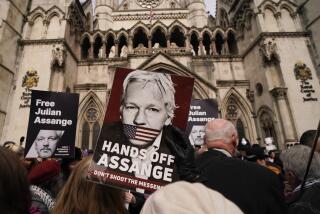High Court Delivers Blow to British Anti-Terror Law
- Share via
LONDON — Britain’s highest court said Thursday that foreigners deemed a security risk could not be imprisoned indefinitely without trial, a major setback to an emergency anti- terrorism law put in place by Prime Minister Tony Blair’s government after the Sept. 11, 2001, attacks on the United States.
The panel of judges from the House of Lords ruled in an appeal filed on behalf of nine terrorist suspects, some held without charge or trial for as long as three years in London’s Belmarsh Prison. The high-security facility in southeast London has been dubbed Britain’s “Guantanamo,” a reference to the United States’ prison for terrorism suspects at its naval base in Guantanamo Bay, Cuba.
In a scathing opinion in the House of Lords chamber, eight of the nine law lords said imprisonment without charges violated the European Convention on Human Rights and threatened the liberty of all Britons by undermining guarantees against arbitrary custody.
Although the prisoners will remain behind bars, at least for now, the decision will force Blair’s government to consider redrafting the anti-terrorism law and bringing the detainees before courts on criminal charges.
“What it means is that, in the future, the likelihood is that suspected terrorists will have to be dealt with in precisely the same way as every other suspected criminal,” said Jeremy Dein, queen’s counsel and a prominent defense attorney.
The ruling presented an immediate challenge to Home Secretary Charles Clarke on his first full day in the position. He had taken over Wednesday night from David Blunkett, who resigned amid accusations that he had improperly used his office to aid the visa application process of his former lover’s nanny.
Clarke was noncommittal in his initial reaction to the decision. “It is ultimately for Parliament to decide whether and how we should amend the law,” he said.
But he made it clear that there was no question of immediate releases. “I will not be releasing the detainees, whom I have reason to believe are a significant threat to the security of our country,” he said.
The ruling broadly paralleled a decision in June by the U.S. Supreme Court that said detainees at Guantanamo Bay, even if they were not U.S. citizens, must be accorded basic legal protections, including the right to challenge their imprisonment in an American court.
The section of the British Anti-Terrorism, Crime and Security Act of 2001 at issue allows for indefinite confinement of foreign suspects when there are “reasonable grounds” to think they are likely to commit or aid terrorist acts. Blair and Blunkett pushed the section into law shortly after the attacks on New York and the Pentagon.
Under the act, suspects are not allowed to hear all evidence against them, and lawyers cannot view all the information that led to their clients’ incarceration.
Lord Leonard Hoffman, one of the judges, said that the act itself might constitute more of a threat to the British way of life than terrorism. “It calls into question the very existence of an ancient liberty of which this country has until now been very proud: freedom from arbitrary arrest and detention,” he wrote.
“The real threat to the life of the nation ... comes not from terrorism but from laws such as these,” he added. “That is the true measure of what terrorism may achieve. It is for parliament to decide whether to give the terrorists such a victory.”
Another judge, Lord Donald Nicholls, called open-ended imprisonment without the protection of a trial “anathema in any country that observes the rule of law.”
The head of the nine-judge panel, Lord Thomas Bingham, said the government’s anti- terrorism measures “unjustifiably discriminate against foreign nationals on the grounds of their nationality and immigration status” and are not needed “since they provide for the detention of some but not all of those who present the same risk.”
“It’s a firm, hugely clear message by the Law Lords to the government saying people are being held illegally,” said Kate Allen, head of Amnesty International UK, quoted by Reuters.
Only two of the 11 prisoners held under the law have been publicly named. But their fate has become the cause of repeated protests.
A statement was issued by one of the prisoners, identified only as inmate “A,” through human rights lawyer Gareth Peirce.
“I hope now that the government will act upon this decision, scrap this illegal ‘law,’ and release me and the other internees,” the statement said.
Speaking later on the BBC, Peirce said that the government would have no alternative but to revoke the act.
“It’s an extremely powerful judgment,” she said.
“If the government doesn’t act swiftly, it will provoke a constitutional crisis of immense proportions.”
The Blair government has argued that indefinite detention was needed in cases in which there was insufficient evidence that would be admissible in court to try dangerous foreign suspects, but the suspects refused to be deported to their home countries because they might face death or torture.
Dein, the queen’s counsel, in a telephone interview said he saw the government as being “between the devil and the deep blue sea” because it probably would be forced to amend the anti- terrorism law to bring it into line with the ruling. At that point, unless it could prove its cases, it would be compelled to free the suspects.
“There is every possibility in the case of one of more of these that they are holding them because they know, on the information that they’ve got, that they are real threats, but ... they can’t prove it. That’s the situation,” he said.
“It doesn’t mean that they are not a threat just because they haven’t got proof.... They may well have very high quality intelligence, which is not admissible in a court of law. And you’d think that they did have that, if they’ve held them for three years.”
*
Janet Stobart of The Times’ London Bureau contributed to this report.
More to Read
Sign up for Essential California
The most important California stories and recommendations in your inbox every morning.
You may occasionally receive promotional content from the Los Angeles Times.










